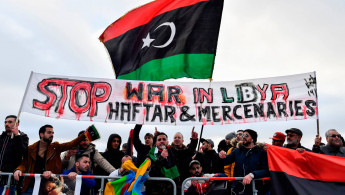Libya's Bashagha says he supports removal of foreign fighters
Libya's parliament-appointed Prime Minister Fathi Bashagha said on Wednesday his government supported removing all foreign forces and mercenaries from Libya, guided by a committee set up to safeguard a ceasefire after the 2014-2020 conflict.
In an interview with Reuters in London, where Bashagha is trying to drum up support for his government to take over in Tripoli, the leader said he was a "big supporter" of the 5+5 committee which agreed foreign fighters should be expelled.
The 59-year-old said his government in the central coastal city of Sirte had begun its work despite Abdulhamid al-Dbeibah, who was installed as prime minister last year through a UN-backed process, rejecting its move, leading to a standoff.
Since April, groups in the east have forcibly closed many Libyan oil facilities to demand that Bashagha take power in the capital, blockading much of Libya's oil output and putting new pressure on world energy prices.
Asked about the presence of the Russian private military contractor Wagner Group in Libya, Bashagha said the group was in Libya but he stood by the 5+5 ceasefire committee, which includes five officers from each side of the 2014-20 conflict, that every foreign force should be out of the country.
"We support that approach strongly, strongly, strongly," he said via a translator, adding that he did not have any relationship with Moscow and that he would work through the 5+5 committee.
Analysis: Russia's return to Africa - France, Mali, and the Wagner factor - Ruslan Trad writes https://t.co/dUksSl7iSJ
— The New Arab (@The_NewArab) October 10, 2021
The role of the Wagner Group in Africa has been put in the spotlight since Russia's invasion of Ukraine in February, with fears that it could further destabilise the region.
Wagner was brought into Libya to support eastern commander Khalifa Haftar, who was backed by Russia, the United Arab Emirates and Egypt in a 2019 offensive against the internationally recognised government in Tripoli.
That assault was turned back when Turkey brought its own forces into the conflict in support of the Tripoli government.
Although Bashagha was interior minister in that Tripoli government, and played a role in orchestrating the fight against Haftar, he is now backed by the same parliament that took Haftar's side in the last war.
Both Wagner and Turkey have established military bases in Libya and remain there despite a clause in the 2020 ceasefire demanding all foreign forces leave.
Ankara and western Libyan factions say the Turkish presence should be exempt because it was brought in through an agreement with the internationally recognised government.
(Reuters)





 Follow the Middle East's top stories in English at The New Arab on Google News
Follow the Middle East's top stories in English at The New Arab on Google News
![The UAE is widely suspected of arming the RSF militia [Getty]](/sites/default/files/styles/image_330x185/public/2024-11/GettyImages-472529908.jpg?h=69f2b9d0&itok=Yauw3YTG)
![Netanyahu furiously denounced the ICC [Getty]](/sites/default/files/styles/image_330x185/public/2024-11/GettyImages-2169352575.jpg?h=199d8c1f&itok=-vRiruf5)
![Both Hamas and the Palestinian Authority welcomed the ICC arrest warrants [Getty]](/sites/default/files/styles/image_330x185/public/2024-11/GettyImages-2178351173.jpg?h=199d8c1f&itok=TV858iVg)